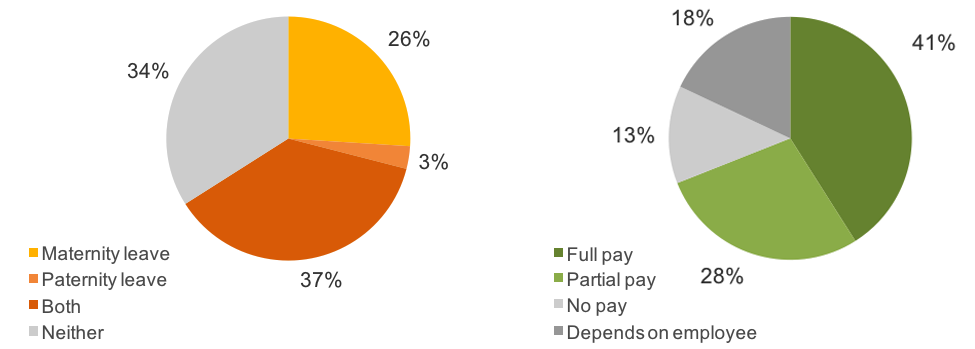When Employer Solutions Are Lacking, Invest in Paid Leave
Working people need paid time off to care for themselves and their family members. Research shows our workplaces aren’t uniformly providing it. Nationwide polling and voter opinion here in Colorado reveal workers demand better.
Policymakers, including those at the highest levels of government, are taking notice. The Trump administration’s budget includes a paid leave proposal, the first time a presidential budget has done so. Unfortunately, the proposal is not designed to meet the needs of the modern American workforce. It leaves out many of the best aspects of current state paid leave programs, such as paid time off for all types of caregiving needs and a threshold for income replacement that is a living wage. The Trump proposal is also nestled amid disastrous cuts to Medicaid, children’s health insurance, and food supports, grossly limiting its potential as an “initiative to help working families.”
In contrast, Colorado’s latest attempt at creating a family and medical leave insurance program was a responsible, inclusive plan that would have helped Colorado working families thrive. The effort was blocked by those singing the same old song: Paid leave benefits are best doled out employers. Despite a great show of support from many individual small business owners and the Small Business Majority, opposition employer groups in our state had major concerns about the purported “undue burden” that HB 17-1307 would create. Small employers would suffer they said, because they would be hard pressed to find ways of doing business if even one employee were to take leave. They mentioned that Colorado employers are already offering tailored leave solutions that help their employees, and that we should let them continue to do so.
These talking points oversimplify realities about work. They fail to recognize the changes happening to our workforce and workplace, and fail to anticipate how they will continue to morph in the future.
First, recent polling shows small business owners want paid leave policies for their employees. The Small Business Majority found that seven out of ten small business owners support paid leave for their employees. Many have difficulty offering such a benefit on their own, which may explain why two-thirds favor state-administered programs that rely on employee and employer contributions.
Second, employers face financial and workplace challenges when paid time off for caregiving is not an option. Employees who are caregivers often must miss work, handle caregiving responsibilities while on the job, and experience poor health, which leads to increased health costs. Colorado businesses are already shouldering these costs, according to analysts at the Colorado Health institute (CHI). CHI projects that the financial impact on employers will grow to $1.1 billion by 2030. Other research by Gallup estimates absenteeism from full- and part-time working caregivers costs our economy between $25 billion and $28 billion annually.
Third, while it’s true some employers offer leave benefits, these options aren’t uniform, nor are they available to all workers. The Family and Medical Leave Act (FMLA) guarantees job protection for certain employees who take up to 12 weeks off. This leave is unpaid and is not required to be offered in workplaces with under 50 employees. FMLA is also contingent upon other conditions as well. The American Enterprise Institute, which supports a targeted, rather than universal, paid leave program, highlights the availability of sick and vacation time, or paid time off (PTO), which is a single pot of leave that can be used for any purpose. But these benefits differ from paid leave insurance programs in that they are accrued time off and not offered to all employees – particularly low-wage workers. The federal government does not require employers to offer these benefits, nor do most states, including Colorado.
The Small Business Majority’s poll found many small employers are offering leave, but the policies range widely (see charts below). Two-thirds offer some type of parental leave, with at least some paid time, but this still means one in three small businesses do not. Policies for other types of caregiving also vary, with 18 percent making decisions on a case by case basis and 13 percent offering no pay.
The majority of small businesses offer parental leave and the majority of those with a policy offer full or partial pay, as evidenced in the below chart.

Lastly, big employers, whose standards and policies can set best practices, are not moving the needle.
Major U.S. companies like Amazon and Starbucks are publicly touting their support and expansion of paid leave policies. But the latest National Study of Employers found the amount of parental and caregiving leave provided by large (over 50 employees) nonprofit and for-profit employers “has not changed significantly” in five years. The U.S. Department of Labor finds that only 13 percent of private sector workers have access to workplace paid leave.
Even when a corporation provides paid leave, major inequalities can exist between types of employees. PL+US (Paid Leave for the United States) found in the private sector, paid leave amounts to an “elite benefit.” Their survey of 36 of the nation’s biggest employers found that in some workplaces there are discrepancies among the paid leave offerings for corporate office employees (often highlighted in news stories) and front line, lower-wage workers.
For example, Walmart, Colorado’s largest private employer, gives 12 weeks of paid leave for birth mothers who are corporate employees, but full-time hourly workers receive only six to eight weeks of partial pay. For many families, partial wage replacement is not enough to pay the bills. This leads PL+US to conclude that “the people who most need paid family leave are the least likely to have it.”
Public investment in paid leave would yield big dividends for employees and employers. Colorado should continue to forge a path toward the future of work.

